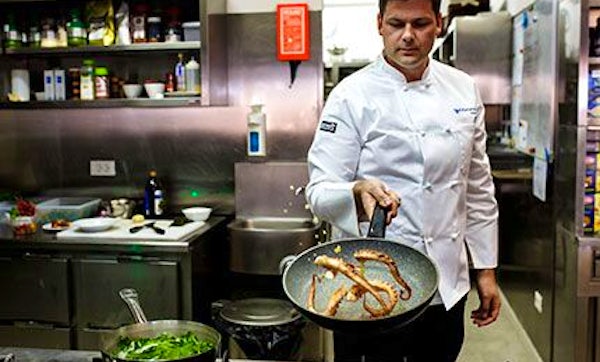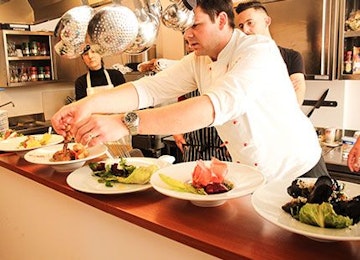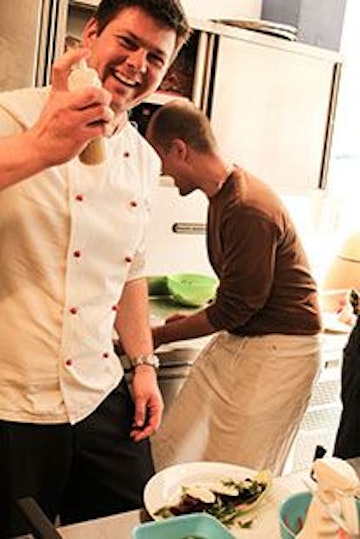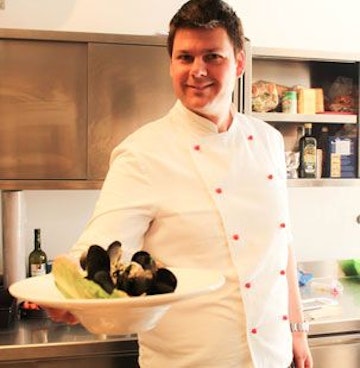Restaurant food waste reduction and recycling in Dalmatia
We sat down with one of Split’s most renown chefs, educator for Kitchen Magic and member of the Croatian Culinary Federation, Ivica Katic, to discuss his insights into the importance of reduction of kitchen waste, and his current work with parts of the Sail Croatia Fleet.
Interview Transcript
GS: Can you tell us about yourself, what you do, for how long, the your biggest achievements?
Ivica: My name is Ivica Katic and I am the head chef for a restaurant in Split. For many years I was working in the best hotel restaurants (5 stars). Additionally, I am also a food and restaurant critic, assessing and rating their work, I am member of the organisation for food quality control and I am constantly working on improving the quality of cooking service in Croatia through many other projects and hobbies.
GS: Kitchen waste is becoming a very popular topic lately, are you facing this issue too?
Ivica: Certainly! Awareness about necessity of waste prevention and recycling is being raised gradually in our communities and also within the hospitality community, especially within the gastro industry. We are becoming aware of the negative impact we are all creating and realising the ability to change our behaviour to head towards a more positive direction. Always using 100% of the produce and leaving no waste or at least only minimal quantities is the best solution for every kitchen, whetherin your personal kitchen, restaurant, hotel, or boat.
GS: What would you say is the easiest way to prevent waste creation and recycle kitchen waste? How is the situation in Dalmatia now?
Ivica: In short, it is alway good to start with food supply, in other words, planning the menu to contain a good selection of quality food products, preparing a Menu that will allow all purchased food to be used - see how to combine courses, how to combine food, then measuring food waste, review stock management and food delivery regularly, store stock correctly, assign responsibilities, create goodhabits and so on. i.e. it is possible to use vegetables more efficiently by making a stock with mixed vegetable peel. You can buy exact amounts of food you want to use today, like steaks of exact weight and proportion, you can buy them without bones and tendons and you avoid waste being created in your kitchen.
It is also important to know what to do with the food that people leave on the plates, buffet counters and other consumption areas. Here, we still have to throw it into general waste bins as others are not provided. It is a pity that we don't have opportunity to compost as we could directly support other businesses in our community.
Basically, we should be all doing what our parents and grandparents were doing, as this was their way of life, saving the money and space, order and the environment was important to them.
Bigger hotels usually have facilities for preparation, various recycling bins and composters which produce soil for their parks and yards. Other objects should be provided with recycling bins, especially for bio waste by city companies and this is still not the case in our community. In our industry there are more than 20 different types of waste that can be separated, including glass, batteries, plastics, paper, cans, electronic waste, ceramics etc. By supporting the gastronomic industry with appropriate recycling systems we could all reap financial as well as environmental benefits.
GS: When talking about waste prevention and recycling in restaurants, people immediately refer to time consuming and costly activities, but we are aware this is not always the case. In your opinion, what are the benefits of recycling for restaurants?
Ivica: I think the biggest benefits could be reducing the costs - cheaper trash fees, reduced purchasing costs and attracting clientele that respect the environment. For plastic bottles it is already known that by separating them it is possible to get some money back. Waste oil from restaurants it is already being used for production of bio fuel and this is something also regulated by the law. There are more and more people who are becoming aware of our influence on the environment and these guests have started to create a great restaurant market.
GS: Does recycling contribute to organisation and performance improvement within the restaurant?
Ivica: Absolutely! Kitchen organisation also means waste separation and gastro services should be the most flexible as we serve people, so they should be flexible also to adapting certain environmental and legal requests. It trains people to answer all the needs necessary for improvement.
GS: There is the statistic that an average restaurant creates over 50 tones of bio waste. How do you see responsibility divided in the restaurant kitchen? Who has the biggest role in preventing the waste being created and sorted out responsibly?
Ivica: The owner should have the biggest responsibility as everything starts from his position. Inside the restaurant, the biggest responsibility goes to Chef, then Restaurant and Bar Manager. However, big hotels usually appoint person who is responsible for waste prevention and recycling, i.e. A Chef Stuart who is maintaining the washing and cleaning.
GS: Do you see some progress here in Dalmatia, when it comes to waste prevention and recycling?
Ivica: You can see some individual processes being introduced but the change should come from the relevant city companies by providing education, organisation and much needed infrastructure, which is still not happening. They are in charge of this problem and without them planning and providing efficient systems to the citizens, we cannot move much further.
Big hotels in Dalmatia, that belong to foreign owners and chains have integrated those processes the moment they started their business here. Unfortunately, their efforts were wasted as the waste they would gather rarely was discarder of or reused appropriately.
GS: What is the system involved with donating food from the hotels and restaurants in Croatia?
Ivica: We follow the HACCP System (The Hazard Analysis and Critical Control Points System) and this system should be kept in mind when talking about food donation. I believe it is possible to use the food waste or leftovers this way, especially for buffet restaurants, however this takes more engagement and therefore expenses. This issue should be solved by the relevant institutions so it doesn't effect business and to allow the unused food to be donated to those in need.
GS: What do you think it is the most important step towards waste prevention and recycling habits?
Ivica: Surely this is education, constant reminders and control first from the side of hotel / restaurant owners and hopefully in the future from the side of relevant institutions or at a government level.




